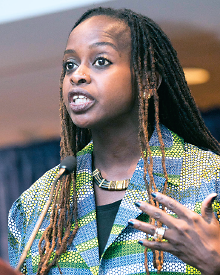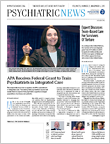When it comes to caring for refugees and asylum seekers, “unfortunately, business is booming,” said Adeyinka M. Akinsulure-Smith, Ph.D., during the Opening Session of the 2015 IPS: The Mental Health Services Conference, which was held last month in New York City.
Akinsulure-Smith, a program psychologist at the Bellevue/New York University Program for Survivors of Torture, delivered a poignant talk about a topic that is dominating the headlines, striving to put a human face on the refugees and asylum seekers who have sought solace in the United States from African countries torn by war and on the Syrian refugees who are likely to arrive soon.
Originally from Sierra Leone, Akinsulure-Smith is a licensed psychologist and an assistant professor in the Department of Psychology at City College of the City University of New York. She is also the co-founder of Nah We Yone Inc., a nonprofit organization created in 1997 to proactively respond to war victims from the various communities within the African diaspora. From 1997 to 2010, Nah We Yone served over 500 African refugees and asylees and their families in New York City, offering them direct services and referrals to legal, mental health, and social services.
According to data presented by Akinsulure-Smith during her talk, the United Nations estimates the number of forced migrants grew from 37.5 million in 2005 to nearly 60 million in 2014—numbers that fail to capture the floodtide of refugees that have since left Syria. Among refugees coming to the United States, some 1.8 million are asylum seekers, according to Akinsulure-Smith.
“Asylum” is a legal term referring to the protected status granted by a nation to people who have left their country due to fears of persecution on account of race, religion, nationality, political belief, or membership of a particular social class. While asylum in the United States confers on people a range of benefits, the legal process for being granted asylum can be lengthy, rigorous, and intimidating; individuals must be able to prove that the persecution from which they are fleeing actually occurred and their fear of persecution if returned is legitimate.
To offer support to refugees and asylum seekers, the Bellevue/NYU program takes an integrated, team-oriented approach toward each individual referred to their care, Akinsulure-Smith said. “Our focus is to rebuild and heal from a holistic interdisciplinary way that focuses on individuals’ resilience, drawing on an integrated model of care to help people use the resources they have to rebuild their lives,” she said.
During the talk, Akinsulure-Smith described “Ms. X,” a 26-year-old refugee from Albania who had fled the country with her husband and small child after repeated threats and a sexual assault related to her family’s political affiliations. The attorney for her asylum petition had repeatedly tried to talk to her about her experiences, but Ms. X had broken down in tears trying to recount her traumatic experiences; that was when she was sent to Bellevue.
“We do a lot of grounding exercises and recovery work,” Akinsulure-Smith said. “She was also referred for psychiatric services; she had a baby and was nursing at the time and wasn’t sure she wanted to be on medication. The family had little or no money—her husband was working under the table—so we provided her Metro Cards to help her get back and forth. Our legal team worked with her attorney to help him understand the limits of what could be expected in questioning her in preparation for the asylum hearing.”
Ms. X was eventually granted asylum in 2007, after a protracted legal proceeding. According to Akinsulure-Smith, her case is typical of the burdens many refugees are bearing: traumatic memories, shame and stigma, fear and uncertainty about the future, and the anguish of being a minority in a strange country.
After reflecting on the angry political rhetoric being used by some presidential candidates and others with regard to undocumented people and Syrian refugees who will be potentially entering the United States, Akinsulure-Smith closed her lecture with a brief slide show of familiar faces, all of whom were refugees: Albert Einstein, Madeleine Albright, Victor Hugo, Sigmund Freud, Ayan Hirsi Ali, Marlena Dietrich, Henry Kisssinger, the Dalai Lama, and Elie Wiesel, among others.
She concluded: “No one chooses to be a refugee.” ■

